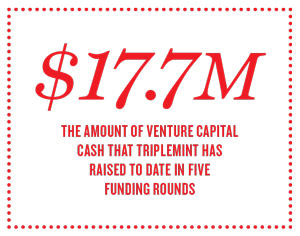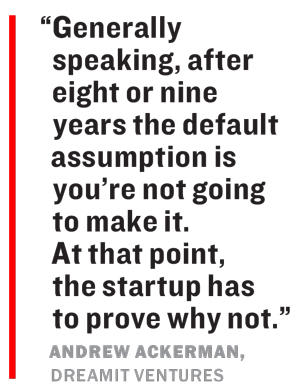
From left: David Walker, Philip Lang and Tyler Whitman (Photo by Sasha Maslov)
In a recent episode of “Million Dollar Listing New York,” the show’s newest cast member, Tyler Whitman, beat out celebrity broker Ryan Serhant on a listing.
“I’m just super-excited that Bubblemint gum finally has their first listing,” said Serhant, flubbing the name of Whitman’s brokerage, Triplemint, and shrugging off the loss.
How staged the scene was is anyone’s guess, but Serhant’s confusion rings true. Outside of some small circles in the proptech and residential brokerage worlds, Triplemint has little name recognition. That, however, is starting to change.
“I want to be to Triplemint what Ryan Serhant was to Nest Seekers,” said Whitman, who’s expanded his team in preparation for an onslaught of new business.
The newfound publicity will undoubtedly translate into dollars and cents for the firm — just as it did for Serhant and fellow “MDLNY” star Fredrik Eklund, whose team at Douglas Elliman became the firm’s top-producing group in the wake of his TV debut.
But with its rising profile, Triplemint — which has both rabid supporters and critics — will also face more scrutiny.
The firm, which was launched by Yale University friends David Walker and Philip Lang under the name Suitey in 2011, claims to be upending residential brokerage by tapping into a market most ignore, or at best leave to serendipity: residential property owners who have not listed their homes.
Its business model is centered on a machine-learning algorithm, dubbed Black Diamond, that combs through public records and consumer data and then uses “predictive analytics” to identify those who seem most likely to sell (whether they know it or not).
 And while the company is still a small fish on the New York brokerage scene, its promise of disrupting an industry that is in the midst of an existential crisis is piquing the interest of some investors. The firm has raised $17.7 million in venture capital money to date.
And while the company is still a small fish on the New York brokerage scene, its promise of disrupting an industry that is in the midst of an existential crisis is piquing the interest of some investors. The firm has raised $17.7 million in venture capital money to date.
According to The Real Deal’s most recent ranking of New York’s residential firms, it closed only $46.1 million in sell-side deals in Manhattan in 2018. Triplemint, however, claims its total sales volume was $300 million in the last year, as of October. (By comparison, the top five firms in the city closed over $1.5 billion each.)
Its investors, meanwhile, include Tyler and Cameron Winklevoss — the entrepreneurial twins who sued Mark Zuckerberg for stealing their idea and using it to launch Facebook — as well as former Cushman & Wakefield President Tom Falus and French “super-angel” investor Fabrice Grinda.
“Triplemint’s the first brokerage to change the experience for the consumer,” said Brock Saunders of Summit Action, which participated in the firm’s $4.5 million Series A funding round. “I think David and Phil have the ability to create a multibillion franchise, and I feel lucky to be part of the journey.”
But that journey has not been completely smooth.
A number of former Triplemint employees and agents told TRD that the technology the firm promised didn’t deliver — though current agents claim their business is seeing a sizable boost. More broadly, some in the tech world just don’t believe that Triplemint’s tech will prove to be that revolutionary. They say iBuying — when companies quickly buy and sell houses — is more likely to transform the residential space.
Andrew Ackerman, an angel investor and managing director at fund and startup accelerator Dreamit Ventures, said Triplemint’s model is “pretty compelling.”
Ackerman — who mentored Walker and Lang and whose wife is a former Triplemint agent — said, however, that this year will be a significant one for the firm.

Ryan Serhant and Tyler Whitman on Bravo’s “Million Dollar Listing New York”
“Generally speaking, after eight or nine years the default assumption is you’re not going to make it,” he said. “At that point, the startup has to prove why not.”
Diamond in the rough
At a recent weekly sales and marketing meeting, Walker sprang to the front of the room to address the 207-person firm.
“Triplemint on three. One, two, three!” shouted the CEO, who was dressed in a signature navy blue tailored suit and Triplemint T-shirt. “Triplemint,” the staffers chanted back.
Many of those staffers have drunk the firm’s Kool-Aid, and Walker and Lang (who is COO) are betting on their platform to keep that buy-in flowing.
Here’s how it works: Black Diamond searches through the firm’s custom-built database and spits out a score for each property. The higher the score, the more likely the owner is to want to sell. The firm then passes the promising leads to a team that contacts property owners.
If owners express interest in selling, they get sent to a Triplemint agent. That agent reaches out and moves them into the “premarket platform,” circulating the property internally and gathering feedback from fellow Triplemint agents and the buyers they represent.
Triplemint claims the platform reduces the amount of time the company’s listings sit on the market to a median 54 days — 40 percent less than Manhattan’s median 89 days, per UrbanDigs.
Summit Action’s Saunders remembered hearing about the premarket platform and thinking, “Gosh, doesn’t that make sense? Why doesn’t everyone do this?”
“I saw the value prop to buyers and sellers very clearly,” he said.
Pat Hedley, who worked for 30 years at private equity firm General Atlantic and also wrote a check to Walker and Lang in 2016, called the combination of the premarket platform and Black Diamond “a game changer.”
 And GeiFaan Kim, who left Triplemint in early 2019 to join virtual brokerage eXp Realty and launch an overseas development firm, recalled seeing early demonstrations of Black Diamond and being impressed. He said that during a mid-2018 presentation where one of the sample sellers happened to be his friend, the system estimated her household income, how long she had lived there, whether she had pets and “actually knew that she was seven months pregnant, which was kind of creepy.”
And GeiFaan Kim, who left Triplemint in early 2019 to join virtual brokerage eXp Realty and launch an overseas development firm, recalled seeing early demonstrations of Black Diamond and being impressed. He said that during a mid-2018 presentation where one of the sample sellers happened to be his friend, the system estimated her household income, how long she had lived there, whether she had pets and “actually knew that she was seven months pregnant, which was kind of creepy.”
Kim recalled going online to see if it all checked out. It did.
“It was cool,” he said. “Wow, there’s a lot of personal information. But it’s all out there in public. Our job is to put it all together.”
Walker declined to reveal what data Triplemint collects but said it is all publicly available — either sourced from public records or purchased from consumer data providers.
Recruitment run
Lang and Walker met rowing at Yale in the early aughts.
Their teammate and longtime friend Bob Casey described that time as “the era of Zuckerberg building Facebook and Jack Dorsey building Twitter.”
Walker took a year off to work on a renewable electronics company called YouRenew that Casey founded (and later sold). Meanwhile, Lang worked for a summer at Lehman Brothers just before it collapsed in 2008 and then as an analyst at Macquarie Capital after graduating.
He quit in 2011 to work on Suitey with Walker, who was still finishing his final year at Yale.
Casey recalled how the duo shuttled between New Haven and New York that first year. He called Walker the “hype man” and Lang more behind the scenes “making the trains run on time.”
For its first two years, Suitey was geared toward rentals — and Walker and Lang were working as agents.

Cameron and Tyler Winklevoss
But in 2013, it rebranded as Triplemint and began participating in a series of venture accelerator programs, which focus on startup growth. It also began to shift into sales and raise money by pitching its tech to investors.
In 2016, it began aggressively recruiting agents and tapped Eric Barron — the former CEO of Keller Williams NYC — as chief revenue officer. He quickly started hiring agents who could close deals, selling them on Triplemint’s cutting-edge technology.
But several employees and agents who were recruited during that time said that the technology didn’t meet their expectations. (Triplemint started building its premarket platform in 2015, began working on Black Diamond in 2016 and debuted Black Diamond in early 2018.)
Eight agents and employees who worked at Triplemint between 2015 and 2017 told TRD versions of the same story: that leads were coming from a handful of people who were manually scouring public records, listing platforms and social media — rather than from a proprietary system.
Triplemint disputes those accounts and said all leads are routed to its dedicated 11-person team — with 10 of those members based in New York and one in the Philippines — to vet before getting passed on to agents.
In 2017, a group of agents confronted Walker and Lang to ask when the technology would be ready, according to three agents.
The founders, they said, admitted there were unexpected delays, apologized and began updating the agents on the progress.
“They owned the fact that they misled,” one of the agents said. “It was actually shocking to us.”
In a statement, the company acknowledged that these meetings occurred, but said it was management that asked agents to give feedback because the company was “behind on a few product launches.” The brokerage also noted that it hired a new chief technology officer in mid-2017 and now gives weekly product updates to the entire staff.

Speaking broadly, Walker said delays are inherent when pushing the envelope on innovation.
“Not everyone can handle the process of creating something new,” he said. “You have to be willing to try things to see if they work, knowing that some won’t.”
Primed for growth?
Walker and Lang say their in-house tools generate roughly half of the firm’s business.
“I think it’s crazy that real estate agents don’t demand that their companies generate business. In what other industry is that the case?” said Walker.
Current Triplemint agents TRD talked to confirmed that they are getting fed business and rave about the platform.
Jed Lewin, an agent who joined in June 2018, said his gross commission income has grown more than 300 percent as a result of leads from Triplemint’s systems.
“They’re not giving me potential,” he said. “They’re giving me business.”
Julianne Bond, who has been at Triplemint for over a year, estimated that about 30 percent of her business comes from leads generated by the firm.
And in some ways the firm is hedging its bets and pushing into the traditional brokerage world. In August, it landed its first new development project, albeit a small one. Agent Gina Ko and her team are handling sales for a 25-unit condo in Astoria called the Alexandra.
Summit’s Saunders pointed to the firm’s strong revenue growth and Triplemint’s 94 Net Promoter Score — an index that ranges from -100 to 100 and measures the customers’ willingness to recommend a company to others — as indicators that “hey, we’re doing the right things.” The firm said it’s NPS has been above 90 for the past three years.
Walker said that Triplemint has aligned every part of its model — including tying agent bonuses to customer reviews — with the clients’ satisfaction. “Our mission is to change the experience for the buyer and the seller,” he said. “How is buying and selling a home not an amazing experience?”
But Mike DelPrete, a real estate tech strategist and scholar in residence at the University of Colorado Boulder, said Triplemint, like Compass, is simply trying to make its agents more efficient. He called it traditional brokerage “with a fresh coat of paint and technology in the back end.”
Dror Poleg, co-chair of the Urban Land Institute’s Technology and Innovation Council, agreed, arguing that creating technology to make agents more efficient is no longer enough.
“It’s becoming a tougher and tougher sell,” Poleg said, citing Realogy as the poster child for that model. “The best-case scenario is just to be a better Realogy,” he said.
Poleg also noted that Triplemint is not the only real estate player using predictive analytics.
He pointed to other venture-backed firms like Opendoor and major institutional players like the Blackstone Group that are also exploring how to harness machine-learning algorithms to fuel business.
“The idea has been out there, including by people with more resources than Triplemint,” he said.
Walker, however, argued that Triplemint has a head start on any rivals. And Lang noted that it takes time to execute on long-term growth plans.
“There’s a quote I’ve always loved … ‘Ten years of hard work and all of a sudden you’re an overnight success,’” Lang said. “A lot of people don’t understand how long it takes to build a large and valuable company.”
The reality TV boost
Both founders and Whitman are anticipating a major growth spurt following their first season on “MDLNY.”
In a webinar he co-hosted with Serhant in October, Whitman vowed that the brokerage would be in 25 markets in the next year.
In July, the brokerage did indeed absorb the 15-agent Hoboken-based Court Street Property Group. At the time, Walker said the firm would be “investing heavily” in New Jersey’s Hudson County and that the move was part of a larger strategy for Triplemint to expand into other markets.
Walker and Lang declined to elaborate on their short-term plans, but Lang said the expansion would be focused on major U.S. metro areas. Saunders, meanwhile, said recent conversations between the founders and investors have focused on mergers and acquisitions.
“I think everyone agrees that the business is primed for growth,” he said. “[Now we’re] navigating the path of how we actually execute on it.”
Meanwhile, Lewin said the firm’s exposure is already paying dividends.
“When I tell sellers we’re one of the ‘Million Dollar Listing’ companies … that goes on a long way,” he said, noting that four former clients reached out to him throughout the season.
Whitman, who was Triplemint’s first employee and is a partner in the company, has not been shy about his high hopes for fame.
“Triplemint is a household name, and my face will be synonymous with that,” he said on the webinar.
He later said that he’s already seeing an upside from “MDLNY.” “My business and price point have grown exponentially,” he noted.
And Triplemint’s founders are banking on his TV success to give the company a boost.
“Tyler wants to be one of the best agents in the city and a spokesperson for the company that we all love?” Walker said. “I feel fantastic about that.”
Correction: A previous version of this story included a photo from Getty mistakenly labeled Cameron and Tyler Winklevoss. The two people in the photo could not be properly identified after the mistake was brought to TRD’s attention, and the photo has since been replaced.
